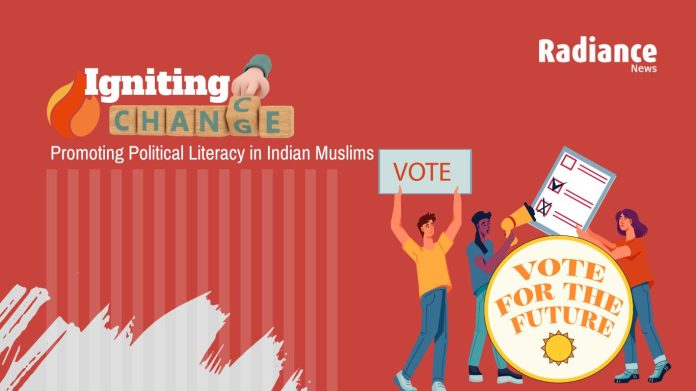
The Quran is the ultimate guide for humankind, offering direction for life in this world and the hereafter. All Muslims in India must understand the importance of politics in Islam and its historical evolution.
India is home to 200 million Muslims, yet there are only 27 Muslim representatives in the Lok Sabha. It is the responsibility of every Muslim to create awareness within the community and ensure active participation in Indian politics.
Youth are the backbone of a community. Muslim youth should use available means to communicate the importance of political participation and their role. We, as followers of Prophet Muhammad ﷺ, should follow his example as leaders and change-makers.
As a Muslim, you are called to be a leader, a change-maker, and a source of hope in society. The time has come to take action, be part of the national political landscape, and contribute to positive change.
Throughout history, Muslims have made significant contributions to various fields, including economy, education, women’s safety, and development. To continue this legacy, we must raise awareness about politics among the youth and ensure their active participation.
In pursuit of this goal, we engage in dialogues with Indian politician Md Rehana Nahid and student Parvez Alam.
 Md Rehana Nahid, Corporator 19th Division
Md Rehana Nahid, Corporator 19th Division
Vijayawada Municipal Corporation, Andhra Pradesh
Indian politics has always been a dynamic and diverse arena, with people from various religious, linguistic, and regional backgrounds actively participating. In recent years, there has been a noticeable increase in the political engagement of Muslims. Historically underrepresented in legislative bodies, more Muslims are now running for political office, advocating for their rights, and contributing to policy discussions.
This shift can be attributed to several factors. First, greater political awareness and aspirations among Muslim youth have emerged due to increased education and access to information. Second, the need for diverse representation in politics has gained traction, leading to the formation of Muslim-centric political parties and the inclusion of Muslim candidates in mainstream political parties.
The rising literacy rates among Indian Muslims have played a significant role in their increased political participation. Education is an empowering force that allows individuals to engage in informed discussions, critically analyze policies, and contribute meaningfully to the democratic process. The improvements in literacy have not only equipped Muslims with the tools to understand their rights and responsibilities as citizens but have also opened doors to various opportunities in politics and governance.
One of the most remarkable aspects of improving literacy rates among Muslims is the increased participation of Muslim women in politics. Traditionally, Muslim women faced barriers to education and political involvement due to various cultural and social factors. However, with improving literacy levels, more Muslim women are joining the political arena. This not only enhances gender diversity in politics but also ensures a broader representation of Muslim perspectives.
The increasing participation of Muslims in Indian politics and the simultaneous rise in literacy rates are two interconnected trends that signify positive change. They demonstrate the community’s growing awareness, aspirations, and commitment to being active citizens in a diverse and complex democracy. The promise of a more equitable and harmonious India shines bright.
 Parvez Alam, Master of Science, Aligarh Muslim University
Parvez Alam, Master of Science, Aligarh Muslim University
India’s election festival is a celebration of color and diversity, adding to its complexity and significance. As the world’s largest democracy, India operates on the principle of adult suffrage. Article 326 of the Indian Constitution grants every citizen the legal right to vote once they reach the age of 18. Each citizen’s vote shapes the nation’s future, and every citizen’s contribution is essential to the nation’s progress. However, the number of Indian voters and voter turnout has been increasing.
The importance of engaging the community in political participation determines the type of leaders chosen, the quality of education provided, the healthcare services available, the business climate, the quality of life for citizens, the governance of the nation, and ultimately, national peace and prosperity.
Moving forward to promote political literacy in the Indian Muslim community:
Speaking to Each Voter Individually: Engaging with voters on a personal level enhances their sense of belonging to society and their capacity to effect real change through voting. Our campaign should address each voter, taking into account their unique circumstances.
Motivating Young Voters: Given the technological advancements of our time, India holds the world’s largest youth population. To increase young voters’ participation in elections, we should cater to their specific needs. Utilizing various social media platforms like WhatsApp, Instagram, Facebook, Telegram, and others can be an effective strategy.
Frequent Citizen Consultation: Rather than limiting citizen engagement to elections, the process of soliciting and hearing citizens’ opinions should be ongoing. This can be achieved through referenda, surveys, public hearings, suggestion boxes, and other means.
Effectively Attracting Voters: Voters should understand that their participation can significantly impact their lives and beliefs. Encouraging voters to dream and realize their dreams through participation can be effectively conveyed in the vernacular language.
Sending Voting Reminders: Psychology suggests that reminders indirectly boost one’s confidence and self-esteem. Reminding voters to cast their ballots on election days can increase voter turnout. Reminders are appreciated because they convey gratitude and inclusivity. Sending messages to voters emphasizing the importance of their vote and their role in the community can foster a sense of unity and accountability within the voting community.
Follow-up: Concerned organizations should ensure that the suggestions they receive are appropriately followed up on to make this exercise beneficial.
Political participation by citizens can alter various dynamics in society. It enhances government responsiveness and accountability, improves the efficacy and long-term viability of government programs, gives marginalized and impoverished individuals a voice in public policy decisions affecting their daily lives, highlights the need for difficult decisions, encourages the maturation of democracy, and transforms representative democracy into a grassroots, participatory democracy.




